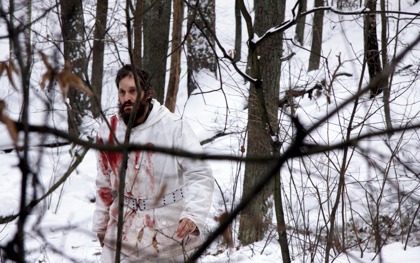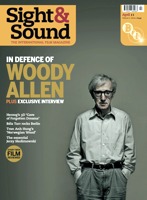Film review: Essential Killing

Jerzy Skolimowski’s visceral study of an escaped jihadi’s struggle for survival in the Polish wilds makes a deft mix of involvement and estrangement, says Tony Rayns
Against the odds, the second short film about killing from a Polish master proves almost as compelling as the first. Jerzy Skolimowski’s film deliberately excludes the sociological dimension of A Short Film About Killing, but its play with offscreen realities and genre does put it within shouting distance of Kieslowski’s ‘cinema of moral anxiety’. As usual Skolimowski focuses on the struggles of a loser, this time a jihadi in Afghanistan who is arrested and tortured by US forces after killing three ‘enemy combatants’. He’s unable to explain to his infidel jailers that he’s lost his hearing at least temporarily because of a missile blast. An accident allows him to escape while he is being ‘rendered’ and he finds himself on the run in the harsh Polish winter. Motivated only by his survival instinct, he kills three or four more people and a dog to win himself a few more hours or days of life. But his situation is fundamentally hopeless, and his end is inevitable.
The genre elements in Essential Killing have given it the label of ‘survival drama’. But there’s nothing heroic about this anonymous jihadi. (He’s never given a name on the soundtrack, only in the cast list in the end credits.) The film is anything but triumphalist, and it’s hardly a celebration of the indomitable human spirit. Skolimowski has long specialised in challenging viewers not to empathise with fundamentally unsympathetic characters, and he starts here from the awareness that the jihadi’s plight will trigger sympathy for purely circumstantial reasons. He periodically takes us inside the man’s head: first to convey his panic at going deaf, second to show his attempts to reassure himself that he was acting on Allah’s will by killing men in Afghanistan, and third to suggest that sentimental memories of a wife and child (or are they self-pitying dreams of what might have been?) prime his instinct to battle on through the snows and forests – and, crucially, to kill again. These glimpses of what’s going on in an increasingly unhinged mind merely underline that this man sees himself as being at war; in their stylised way, they’re part of the film’s realist foundations, anchoring the story in the realities of the ‘war on terror’ and ‘extraordinary rendition’. The truth of this backstory prevents the film from becoming a vacuous fable in the vein of Losey’s all-too-abstract Figures in a Landscape. The recognisable political context meshes with our memories of war movies and hunters-and-hunted plots to provide a charged fictional terrain on which Skolimowski can raise questions about humanity and inhumanity.

To call them ‘questions’, though, is probably overstating the case. The film’s real achievement is to blur the line between detachment and involvement: to create a situation in which the viewer feels close to a dying protagonist while at the same time remaining free to judge his ever-more-desperate actions. The strategy is in some ways analogous with Hitchcock’s fondness for generating unease by manipulating audiences into identifying with flawed and potentially villainous characters, but the only recent film that comes to mind as working in quite this way – with similar moral anxieties built into its structure and method – is Jia Zhangke’s Xiao Wu, another empathetic portrait of a loser who finally vanishes from his own film.
Skolimowski made no films between 1991 and 2008 (he says he spent the time painting), and was apparently nudged back into the fray by acting in Cronenberg’s Eastern Promises. It’s interesting that his two ‘comeback’ films are both in some sense responses to the most popular films in Kieslowski’s Dekalog: the exploration of desire and voyeurism in Four Nights with Anna (2008) plays like a commentary on the subtexts in A Short Film About Love, while this film, as we’ve noted, reframes the moral issues behind A Short Film About Killing. Skolimowski, though, is the ‘wild man’ that the urbane Kieslowski never could be, and in Vincent Gallo he’s found an actor to match his own fearlessness. Essential Killing would be much less powerful if it didn’t show the jihadi’s physical sufferings with such visceral immediacy, and if the realism weren’t strong enough to deliver surrealist shocks like the staggering final image.
See also
The wild bunch: Sight & Sound’s 50 ‘mad, bad and dangerous’ directors (September 2009)
Team America World Police reviewed by Leslie Felperin (January 2005)
Gerry reviewed by Ryan Gilbey (October 2003)
Xiao Wu reviewed by Tony Rayns (March 2000)



